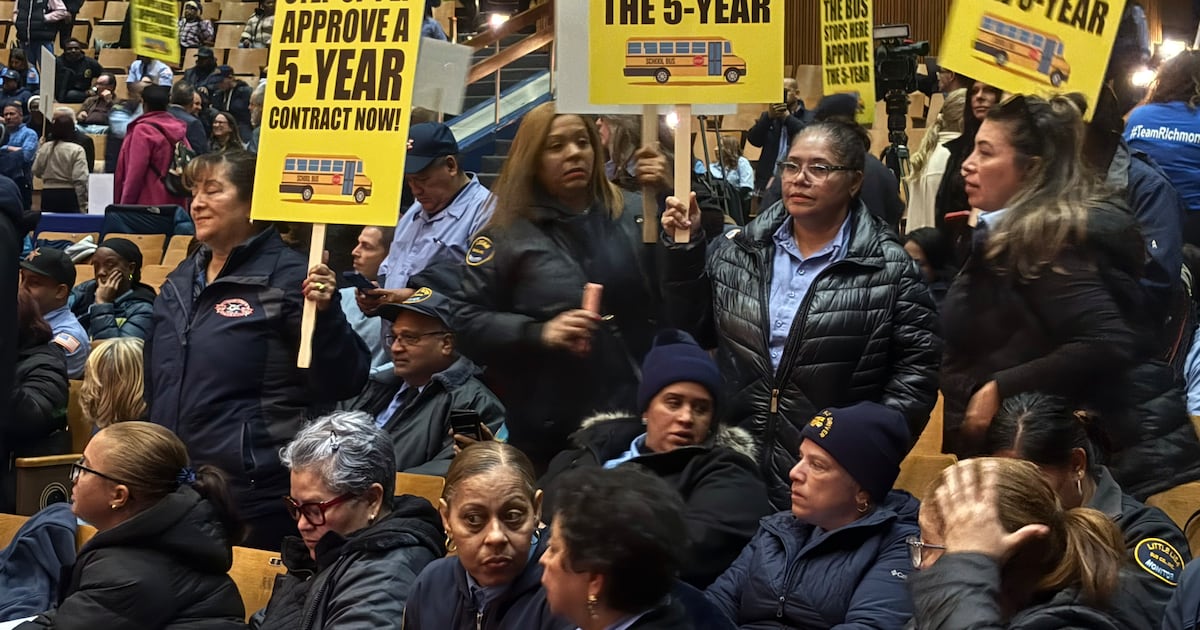Sign up for Chalkbeat New York’s free daily newsletter to get essential news about NYC’s public schools delivered to your inbox.
As New York City’s yellow school buses continue their fight for a new contract, a little more than half of the companies agreed to a contract extension — but that could still leave tens of thousands of students without service next week.
Twenty seven of the 52 bus companies agreed to extend the contracts for November and December, schools Chancellor Melissa Aviles-Ramos announced at Wednesday night’s meeting of the Panel for Education Policy, the school board that approves major contracts from the Education Department.
Four of the largest bus companies, Logan, Consolidated Transit, Pioneer, and First have not signed the emergency contracts, according to a source familiar with the agreement.
Roughly 50,000 to 60,000 students may not have bus services next week, said Richard Bamberger, a spokesperson for the bus companies.
About 150,000 students rely on yellow school buses citywide. The disruptions could disproportionately affect students with disabilities: Roughly 43% of students who ride buses have disabilities.
The five-year contract between bus companies, the city, and the Department of Education expired in June. Since then, the bus companies have been operating on emergency contracts extended on a monthly basis.
But they do not want monthly extensions anymore. Last week the companies were preparing to halt operations and lay off employees on Nov. 1 if they didn’t receive a five-year contract extension. Aviles-Ramos and others had concerns about approving a contract that would outlast the incoming mayor’s first term.
The city spent nearly $2 billion on school busing last year, a sprawling system rife with problems, including delayed and no-show buses, unnecessarily long commute times for students, and lack of air conditioning. Simply renewing the existing contracts curtails the city’s ability to negotiate better outcomes, officials have said.
Panel members unanimously voted Wednesday on a resolution opposing the five-year contract, saying that it lacked vendor accountability and better services. The contract is due for a vote before the panel on Nov. 19.
During four hours of emotional testimony at Wednesday’s meeting, tearful parents, bus drivers, and panel members argued with each other, saying they were trying to do what was best for the city’s students.
Hundreds of bus drivers roared “five more years,” demanding to extend the contract. Parents shared mixed and strong opinions. Several backed the drivers, acknowledging that the contracts had flaws, but they said their children need bus service next week. Others spoke in favor of the panel’s position.
“Please understand we’re here for you, your kids, your job, your livelihood,” said panel member Rima Izquierdo to the bus drivers. “We support you. You all need to support us too. [The companies] are making money on all of us, and it is not fair.”
Izquierdo has been a vocal critic of the bus companies, raising awareness of the sweltering conditions on buses in the heat and fighting to improve commute times. She believes the city should work out a better deal with the companies that could improve service for children.
“Bus staff, they’re underpaid, they’re overstaffed, they’re overworked. This is not working. The status quo is not working,” said Maggie Sanchez, a member of the Citywide Council on Special Education, speaking against the current contracts.
But some parents worried about the immediate effects of delaying a contract.
“This service is far more than a convenience. It is a vital part of our daily lives, ensuring our children arrive at school safely, consistently and on time,” said Denise Martinez, a mother who wanted to renew the contract.
Wednesday night’s resolution also called on the city to rebid or contract with new bus companies. The city, however, won’t be able to make a deal without offering an Employee Protection Provision, or EPP, a protection that guarantees laid off unionized bus workers are prioritized for hiring by other companies at their current wages.
A 2011 state court decision prevents EPP from being inserted into new contracts — it can only exist in extended contracts. That’s why advocates like Sanchez were against the five-year contracts. She, along with the panel members, want to convince the state to sign bills that allow EPP in the rebidding process.
“It would allow the city to move forward with its new bus contracts while keeping current job protections in place,” Sanchez said about passing the resolution that rejects the five-year extension.
The Education Department will offer alternative options for students who don’t have bus service, including free OMNY cards, prepaid rideshare, and transportation reimbursement options. The department is also partnering with the city’s police department and Metropolitan Transportation Authority, Aviles-Ramos said, noting there will be increased transportation and pedestrian traffic going to and from schools.
Chalkbeat New York reporter Michael Elsen-Rooney contributed.
Ananya Chetia is an intern at Chalkbeat NY. Contact Ananya at achetia@chalkbeat.org.
Inspiration, advice, and best practices for the classroom — learn from teachers like you.
Across all of our bureaus, Chalkbeat reporters interview educators with interesting, effective approaches to teaching students and leading their schools. Get the best of How I Teach sent to your inbox for free every month.
